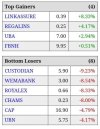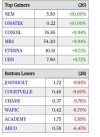The Nigerian Stock Exchange (NSE) is still reeling from the effects of the coronavirus on the economy. The NSE's benchmark All-Share Index ̈(ASI) has lost 31.8% in the past three months, reaching that figure from a 26,842.62 peak on February 24 this year. It also fell by 9% at the start of 2020 before the COVID-19 pandemic began. The ASI closed at 18,288.02 on May 18, 2020, its lowest point since July 11, 2016. This means Nigeria has entered a bear market a market where share prices fall 20% or more from recent highs and are unlikely to recover for some time. According to analysts, market performance has been affected by naira devaluation and rising inflation due to COVID-19."
The Nigerian Stock Exchange (NSE) is still reeling from the effects of the coronavirus on the economy. The NSE suffered a massive drop in its market capitalization, but has been able to recover some of its losses with an increase in company listings this year compared to last year.
The NSE's benchmark All-Share Index ̈(ASI) has lost 31.8% in the past three months, reaching that figure from a 26,842.62 peak on February 24 this year.
The ASI is a weighted index of the top 40 companies listed on the NSE, whose weights are determined by their market capitalization as listed on their respective markets. The divisor used to determine index membership is 40 and each company's weighting in terms of its market capitalization is multiplied by 10⁵ (the number 10 to the power of 5). This gives rise to an index value that represents total market capitalization for all constituent stocks at any given time; however, it does not represent what an investor would pay for shares in these companies because it doesn't take into account differential stock prices across different exchanges/markets or individual trading volumes within those exchanges/markets.
The ASI fell by 9% at the start of 2020 before the COVID-19 pandemic began.
The ASI fell by 9% in the first quarter of 2020.
The All Share Index (ASI) is a stock market index used to measure the performance of Nigerian companies listed on the Nigeria Stock Exchange. The ASI, which was first calculated in 1989, is based on share prices and each stock's free float factor. This means that it doesn't include unlisted or foreign-based companies.
The ASI is calculated using prices of shares traded on the NSE, which are weighted by their respective free float factors and then combined into one value called "All Shares Index." By doing this, you can see how well your portfolio could have performed compared with Nigeria's overall economy had you invested in securities directly rather than through mutual funds or ETFs such as Vanguard FTSE Emerging Markets ETF (VWO).
The bear market is usually associated with economic downturns, recessions and even prolonged periods of stagnation. This means that Nigeria has entered a bear market. A bear market is one where share prices fall 20% or more from recent highs and are unlikely to recover for some time.
In fact, the current situation in Nigeria can be described as a full-blown economic crisis. According to the World Bank report released on October 10th 2018: “Nigeria’s economy has slowed down due to lower oil prices and falling exports; inflation has risen above 20 percent; foreign exchange reserves have fallen sharply since 2016; public debt has increased significantly since then too. The budget deficit was 4 percent of GDP in 2017 but it could be double that this year if oil production does not improve soon enough."
The Nigerian Stock Exchange (NSE) is the largest stock exchange in Africa, with a market capitalization of over $500 billion. The NSE has been affected by naira devaluation and rising inflation due to COVID-19. According to analysts, market performance has been affected by naira devaluation and rising inflation due to COVID-19, which is a virus that causes measles.
The Consumer Price Index (CPI) is the most widely used measure of inflation. It serves as an indicator of price changes associated with a representative basket of goods and services consumed by households. The index measures changes in the price of goods and services purchased by consumers, including food, health care commodities, apparel, transportation and communication.
The CPI is compiled from prices collected from a sample that represents about 29 percent of the population. The weights assigned to each item are based on consumer expenditures for each category in December 2017. The Bureau of Labor Statistics updates these weights every two years after conducting surveys with consumers on their purchasing habits over the last six months before the review period ends on June 30th or December 31st each year depending upon which month it falls into so they can determine if any new items have been introduced since then which will require updating those weightings accordingly when calculating an average cost per unit for each product category across America’s 35 largest metropolitan areas and rural areas across America (excluding Alaska).
This allows them all together represent inflation at large scale level since January 2000 when this system was started back then until today's date where many other types exist such as core CPI (which excludes volatile food & energy prices), ex-rental housing costs instead focusing only rental housing costs; CPI excluding taxes paid on everything except rent paid out monthly instead focusing solely rent payments received monthly etc...
The NSE's benchmark All-Share Index ̈(ASI) has lost 31.8% in the past three months, reaching that figure from a 26,842.62 peak on February 24 this year. It also fell by 9% at the start of 2020 before the COVID-19 pandemic began. This means Nigeria has entered a bear market a market where share prices fall 20% or more from recent highs and are unlikely to recover for some time. According to analysts, market performance has been affected by naira devaluation and rising inflation due to COVID-19
The Nigerian Stock Exchange (NSE) is still reeling from the effects of the coronavirus on the economy. The NSE suffered a massive drop in its market capitalization, but has been able to recover some of its losses with an increase in company listings this year compared to last year.
The NSE's benchmark All-Share Index ̈(ASI) has lost 31.8% in the past three months, reaching that figure from a 26,842.62 peak on February 24 this year.
The ASI is a weighted index of the top 40 companies listed on the NSE, whose weights are determined by their market capitalization as listed on their respective markets. The divisor used to determine index membership is 40 and each company's weighting in terms of its market capitalization is multiplied by 10⁵ (the number 10 to the power of 5). This gives rise to an index value that represents total market capitalization for all constituent stocks at any given time; however, it does not represent what an investor would pay for shares in these companies because it doesn't take into account differential stock prices across different exchanges/markets or individual trading volumes within those exchanges/markets.
The ASI fell by 9% at the start of 2020 before the COVID-19 pandemic began.
The ASI fell by 9% in the first quarter of 2020.
The All Share Index (ASI) is a stock market index used to measure the performance of Nigerian companies listed on the Nigeria Stock Exchange. The ASI, which was first calculated in 1989, is based on share prices and each stock's free float factor. This means that it doesn't include unlisted or foreign-based companies.
The ASI is calculated using prices of shares traded on the NSE, which are weighted by their respective free float factors and then combined into one value called "All Shares Index." By doing this, you can see how well your portfolio could have performed compared with Nigeria's overall economy had you invested in securities directly rather than through mutual funds or ETFs such as Vanguard FTSE Emerging Markets ETF (VWO).
The bear market is usually associated with economic downturns, recessions and even prolonged periods of stagnation. This means that Nigeria has entered a bear market. A bear market is one where share prices fall 20% or more from recent highs and are unlikely to recover for some time.
In fact, the current situation in Nigeria can be described as a full-blown economic crisis. According to the World Bank report released on October 10th 2018: “Nigeria’s economy has slowed down due to lower oil prices and falling exports; inflation has risen above 20 percent; foreign exchange reserves have fallen sharply since 2016; public debt has increased significantly since then too. The budget deficit was 4 percent of GDP in 2017 but it could be double that this year if oil production does not improve soon enough."
The Nigerian Stock Exchange (NSE) is the largest stock exchange in Africa, with a market capitalization of over $500 billion. The NSE has been affected by naira devaluation and rising inflation due to COVID-19. According to analysts, market performance has been affected by naira devaluation and rising inflation due to COVID-19, which is a virus that causes measles.
The Consumer Price Index (CPI) is the most widely used measure of inflation. It serves as an indicator of price changes associated with a representative basket of goods and services consumed by households. The index measures changes in the price of goods and services purchased by consumers, including food, health care commodities, apparel, transportation and communication.
The CPI is compiled from prices collected from a sample that represents about 29 percent of the population. The weights assigned to each item are based on consumer expenditures for each category in December 2017. The Bureau of Labor Statistics updates these weights every two years after conducting surveys with consumers on their purchasing habits over the last six months before the review period ends on June 30th or December 31st each year depending upon which month it falls into so they can determine if any new items have been introduced since then which will require updating those weightings accordingly when calculating an average cost per unit for each product category across America’s 35 largest metropolitan areas and rural areas across America (excluding Alaska).
This allows them all together represent inflation at large scale level since January 2000 when this system was started back then until today's date where many other types exist such as core CPI (which excludes volatile food & energy prices), ex-rental housing costs instead focusing only rental housing costs; CPI excluding taxes paid on everything except rent paid out monthly instead focusing solely rent payments received monthly etc...
The NSE's benchmark All-Share Index ̈(ASI) has lost 31.8% in the past three months, reaching that figure from a 26,842.62 peak on February 24 this year. It also fell by 9% at the start of 2020 before the COVID-19 pandemic began. This means Nigeria has entered a bear market a market where share prices fall 20% or more from recent highs and are unlikely to recover for some time. According to analysts, market performance has been affected by naira devaluation and rising inflation due to COVID-19



